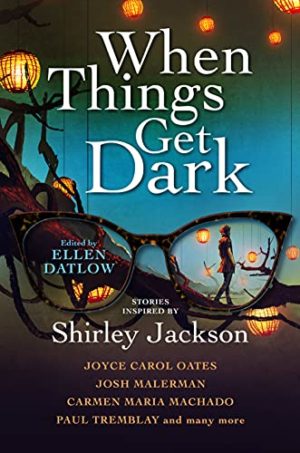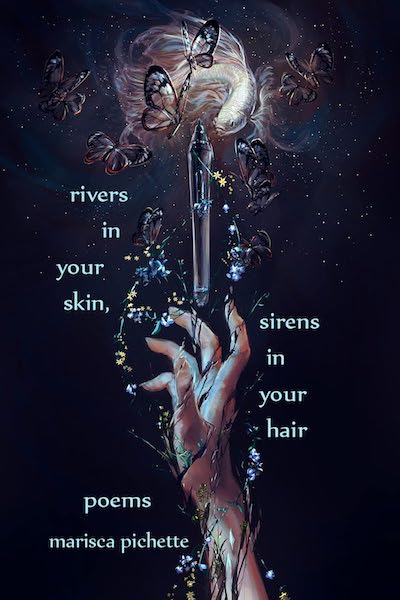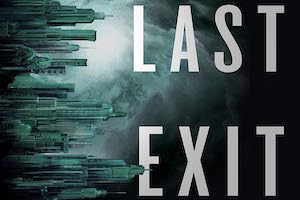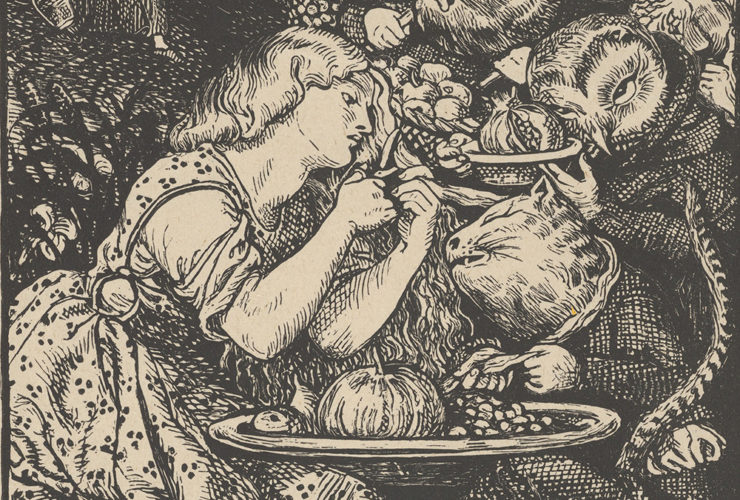Welcome back to Reading the Weird, in which we get girl cooties all over weird fiction, cosmic horror, and Lovecraftiana—from its historical roots through its most recent branches.
This week, we cover Kelly Link’s “Skinder’s Veil,” first published in Ellen Datlow’s 2021 anthology: When Things Get Dark: Stories Inspired by Shirley Jackson. Spoilers ahead!
“If you drew a picture of Andy’s psyche it would be Andy, standing outside of the house where he lives.”
Once upon a time…
Andy Sims is struggling with his doctoral dissertation. It doesn’t help that roommate Lester has acquired an out-of-his-league girlfriend, Bronwyn, with whom he has frequent, noisy sex. Andy’s friend Hannah offers relief: She’s got a family emergency and needs someone to cover her house-sitting job in Vermont. Conveniently, if uncomfortably, Bronwyn offers to drive him to middle-of-nowhere Skinder’s Veil, Lester in tow.
En route, Bronwyn reveals that she’s with Lester because he’s “ghost repellent.” Only with him is she free from the invisible presence that’s haunted her since adolescence. While Lester’s absent at a rest stop, the presence reappears. Though he’s skeptical, Andy tells it to stop bothering her.
They arrive at Skinder’s Veil late. It’s a sunny yellow house with a green door, isolated in dense forest. Bronwyn and Lester leave. Hannah’s gone to catch her plane, leaving instructions about domestic arrangements like WiFi and grocery delivery. The house’s owner, Skinder, has two ironclad rules: ONE, if any of his friends show up, let them in. They may be weird, but they’re harmless. They’ll stay as long as they like, taking care of themselves. TWO: If Skinder shows up, DO NOT LET HIM IN!
At night mist—the “veil” of the house’s name—may rise around the house. It’s some kind of natural phenomenon. The well water’s okay but tastes funny. It’s said to “open your inner eye,” like a free drug. AND DON’T LET SKINDER IN NO MATTER WHAT HE SAYS. Andy will know who’s Skinder because the friends ring at the kitchen door while Skinder rings at the front door. Also, Skinder always has a little black dog.
Andy explores the house, which seems normal enough, except for the painting of a bearlike creature and a framed cross-stitch motto: WEST EAST HOME IS THE BEAST. These weirdnesses aside, beer and cannabis gummies afford Andy undisturbed sleep.
Late on a night shrouded in Skinder’s mist-veil, his first visitor arrives: an attractive woman named Rose White. She invites herself into Andy’s bed; after sex, she tells him an eerie story. Andy falls asleep, waking the next morning to find he’s written 4000 words on his dissertation. Several days pass in the same pleasant manner: Andy and Rose hang out, have sex, Rose tells a strange tale, then in a dream-trance Andy produces dissertation pages. The last night, Rose brews tea from mushrooms she’s gathered in the woods. All Andy remembers next day is Rose White telling him she has a sister, coming soon, named Rose Red. Then two deer ring the kitchen doorbell—more friends. Rose tells the story of a real estate agent who murdered a client because she realized he was Death. Decades later, unable to die, she gathers the dismembered pieces she hid, but can’t find them all. She regrets murdering Death: didn’t he have a right to a house, like anyone else?
Rose leaves. Dissertation progress stalls. More visitors arrive: a turkey, a grayish man in Birkenstocks whom Andy avoids, an opossum, the mist-veil itself. His last human visitor is Rose Red, who resembles Rose White but denies she has a “sister.” She makes risotto with Rose White’s mushrooms. Another kitchen-door ring heralds a brown bear, with whom Rose Red seems familiar. The bear tells the tale of a haunted swimming pool. Rose Red tells one about how Death lived in a house overseen by a keeper whenever he traveled. At these times Death could not enter his own house, but any creature who’d escaped Death could stay there without fear of Death finding them. To those who keep Death’s house, he’ll one day pay his debt of gratitude.
Buy the Book
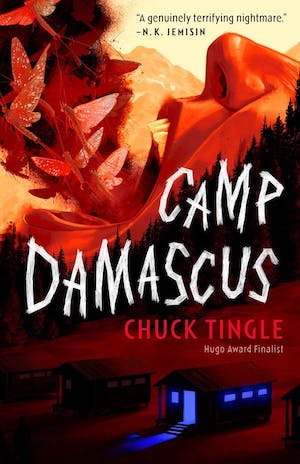

Camp Damascus
The bear and Rose Red are gone by dawn. The next bell rings at the front door. Andy peeks out at Skinder and his black dog; the man looks like—himself. Skinder requests entry. Andy refuses, per Rule Two. Skinder and his dog leave in a black Prius.
Hannah returns. Andy asks if Skinder looks like him. Not really, she answers, then hurries him out to a waiting Uber after exchanging the well water in his travel bottle for bottled water. Back in Philadelphia, Bronwyn and Lester have broken up. Now Lester seems haunted. Sometimes Andy almost sees Lester’s ghost, formless but for eyes and mouth reminiscent of Skinder’s dog.
Andy finishes his dissertation. He quickly secures a tenure-path position; years later, a member of the hiring committee confides that he dreamt of a bear, who said he’d regret it if he didn’t hire Andy. It turns out all the committee members had this dream! Andy accepts what’s been given. He marries, has children, but won’t get them a pet dog.
More years later, he attends a conference in Vermont and looks for Skinder’s Veil. He wanders down wooded highways, none familiar. Toward dusk, he swerves to avoid a deer, and his car barrels down the embankment. He’s not badly hurt, but his cell phone has no reception, so he follows a well-worn path (he hopes) to civilization.
Instead he finds Skinder’s Veil and rings the front doorbell. That other Andy answers, his black dog behind him. Andy asks to come in, but Skinder says no and shuts the door. After a while, Andy goes to find the path again.
Libronomicon: Lots of books, ranging from Andy’s dissertation which might be called “An Exploratory Analysis of Item Parameters and Characteristics that Influence Response Time,” to the Stephen King and Michael Connelly on Skinder’s shelves, to the unpublished, deathly beautiful book written by one of the sub-story sisters.
Weirdbuilding: Three words: Adjuncts of the Corn.
Madness Takes Its Toll: Psychedelic risotto is the best risotto.
Ruthanna’s Commentary
This is the nicest story inspired by Shirley Jackson that I’ve ever read. Possibly the coziest weird fiction in general. After a week in bed with a fever, it was also exactly what I craved. More stories in which weird things happen and people enjoy them! More stories in which everything turns out all right because people follow the seemingly-irrational rules! More stories in which talking bears help people survive the academic job market!
I’m also a sucker for story-within-a-story structures, even if only an extra layer deep. No stories about people who meet someone who tells a story in which someone tells a story to explain how they got there. But little puzzles a-plenty: did Skinder buy this house from a real estate agent after the author and her bleeding beta reader sister left it behind? Are Rose White and Rose Red actually related, and if so are they the sisters from the substory, or from the fairy tale, or both, or neither?
Stories are magic—a common theme, shockingly, of stories, but also a true one. A story with a bloody ending, or no real ending at all, can still soothe you to sleep, or provide inspiration when you need it most. A story can be a gift, or hint at a mystery, or provide an excuse to talk. Such excuses are needed, because Andy’s conversations outside of Skinder’s house are all awkward or unpleasant. Even Hannah shies from discussing their shared experiences, and Bronwen disappears before he can try. Communication is hard, writing is hard—except when the stories come out to play.
Then there are the real-world micro-horrors weaving their way through: annoying housemates, grad school stress, running late because the driver makes terrible choices. They contrast pointedly with the oddly good (nicely odd?) company at Skinder’s house, and with Bronwen’s silent haunt. Details are a source of anxiety; only the numinous provides relief. Though I also love that the numinous comes with its own grounding detail: psylocibin and stir-fries and housesitting fees and bear poop duty.
Having been in grad school, I’m envious of Andy’s dissertation support resources. A summer house-sitting for Death would have been just the ticket for breaking through writer’s block; everyone would’ve done it if they could, whether or not they knew what they were getting into. A dream-bourn letter of recommendation from a talking bear would be even more welcome. Plus one bonus Get Out of Dying Free Card! It’s a pretty sweet deal. Dubious hiring process, but there’s probably no policy against it.
I do wonder where Skinder goes on vacation. (Insert obligatory Sandman and Discworld references here.) This is not the point of the story, but he does have an awfully nice house—apparently with fewer friends over when he’s actually home, but still a pleasant place to relax and get away from things. Perhaps he’s one of those entities, then, that wants a jam-full schedule on vacation, all the tourist attractions and dining out every night? Or package deals at amusement parks with poor safety records? Or perhaps, as I like to in a new city, he just wanders, taking time to enjoy aspects of life that aren’t its end.
No, I am going to actually make that Sandman reference, because Skinder’s house is an awful lot like that Death’s: homey and welcoming. And I suspect his vacations are much the same. Ice cream and philosophical discussions with strangers, dancing and sitting in the sun and visiting strange little bars. Skinder is a friendly sort of Death, the kind who likes humans. And living mist. And talking bears. And random deer. The kind who loves his work, and who loves the world of which that work is an unavoidable part.
That’s the sort of Death, and the sort of world, that can occasionally make the strangest events very comfortable indeed.
Anne’s Commentary
Part of my brain always wrestles with the internal (infernal) logic (illogic) of fairy tales, demanding reasons why, and that they cohere to answer the great question: “What even the hell is this story about?” The other part is content to luxuriate in the much-eddying, many-channeled stream of language and fancy that is “Skinder’s Veil.” It wants nothing to do with keyboards, so let Rational Brain have at it.
With her first four words, Link signals she is telling a fairy tale. Actually, “Veil” contains several fairy tales, most told a la Scheherazade by Rose White. Rose Red tells the last tale, which explains the nature of Skinder’s Veil by revealing Skinder is Death himself. Rose White’s last story semi-synchs with Rose Red’s in that it involves a house Death wants to view and the realtor who, fearing he’s come to claim her, kills and dismembers him. Later, she wonders whether Death really was after a house, not her—why shouldn’t Death want a home of his own?
As “Veil” appears in an anthology inspired by Shirley Jackson, I recall another character who longs for her own true place in the world. Like Eleanor Vance, Andy leaves an unhappy abode for a house isolated in the woods. Hill House is weird down to its timber skeleton, designed askew. Skinder’s house is picturesque outside, cottage-cozy inside. What makes it weird are Skinder’s rules and visitors and Veil, a nocturnal mist that doubly isolates it. (Remember the preternaturally white woods in which Eleanor and Theodora lose themselves one night?) In these weird places, Eleanor and Andy experience weird things, which might be explained by mental illness (for Eleanor) and copious drug use (for Andy.)
In Rose Red’s bedtime story, Death finds a house so comfortable he’s tempted to neglect his duty to make sure all living things die at their appointed times. To force himself out, he installs a housekeeper who won’t let him come home early. Problem is, his absence creates a safe refuge for people and animals who have somehow escaped Death and who must now constantly flee him.
These are Skinder’s kitchen-door “friends.” But their story isn’t Andy’s. He’s a housekeeper—sometime down the path Andy resumes on leaving Skinder’s Veil, Death will pay him a special debt of gratitude. Andy’s all about paths, specifically the path to his future as a tenured professor (as both his parents were.) A finished dissertation is only the first stop along his way. He mostly blames Lester and Bronwyn’s sexual athletics for stalling his progress, but maybe Lester’s right about Andy. Maybe he does map everything out to avoid thinking about what he really wants. According to Lester, Andy has “no interior life at all.” Forget psychobabble about the attics and basements of the mind where people don’t go. Andy’s “standing outside the house where he lives. He won’t go inside. He won’t even knock on the door.”
Skinder/Death will at least ring the doorbell. Both remain outside, however. Maybe that’s why they look like one another? Maybe that’s why, finally, they reverse roles, with Andy outside and Skinder/Death denying him admission?
Skinder’s companion may be a reference to the folkloric black dog which is an omen of death. Rose White and Rose Red recall the German fairy tale, “Snow-White and Rose-Red.” In the Grimms’ version, two sisters befriend a bear who knocks on their door to ask for shelter from the winter cold. Less grateful is a dwarf whom the sisters rescue from several perilous situations. They last encounter the dwarf as a bear is about to kill him. Ever the jerk, the dwarf begs the bear to eat the girls instead. The bear swats him dead; the dwarf’s previous spell broken, the bear turns back into a prince, recognizes his old friends, and marries Snow-White. Don’t worry about Rose-Red. She gets the prince’s brother and doesn’t resent Prince One’s choice, from the way Link’s Rose-Red cozies up to the visiting bear.
A sort-of-bear figures in a painting in the Vermont house. This bear may be the homely Beast of the cross-stitch motto. Dreams of a bear make the hiring committee choose him for a teaching spot and eventually tenure: Death paying his debt? Perhaps a left-handed payment, since it keeps Andy firmly on that path he might not have really wanted to follow.
Much later, the whim strikes Andy to look for Skinder’s Veil. He can’t find it by randomly driving country highways; to get off his present path back onto one that leads to the Veil, a deer has to force him down an embankment and into the woods, where a well-trodden trail awaits him. He believes he wasn’t badly injured by his accident, but—maybe he was killed? Maybe it’s his spirit that follows the trail to the yellow house and rings the front doorbell. Skinder, “the other Andy,” answers, black dog on his heels. He turns Andy away, which if Skinder is Death is either returning Andy to life or condemning him to a ghostly semi-existence.
Rejected, Andy looks again for his path. Finding it could mean he’s alive and back on his same old track. A futile search could mean he’s stuck between life and Death. Either way, do we end with another left-handed gift from Skinder?
I regret having no space to discuss the “presence” that dogs Bronwyn, then Lester, then perhaps Andy, who when looking at his students may actually see something near them.
I do love that “presence,” though.
Next week, we go on the road with the first two chapters of our new longread: join us for Max Gladstone’s Last Exit!
Ruthanna Emrys is the author of A Half-Built Garden and the Innsmouth Legacy series, including Winter Tide and Deep Roots. You can find some of her fiction, weird and otherwise, on Tor.com, most recently “The Word of Flesh and Soul.” Ruthanna is online on Twitter and Patreon and on Mastodon as [email protected], and offline in a mysterious manor house with her large, chaotic household—mostly mammalian—outside Washington DC.
Anne M. Pillsworth’s short story “The Madonna of the Abattoir” appears on Tor.com. Her young adult Mythos novel, Summoned, is available from Tor Teen along with sequel Fathomless. She lives in Edgewood, a Victorian trolley car suburb of Providence, Rhode Island, uncomfortably near Joseph Curwen’s underground laboratory.










